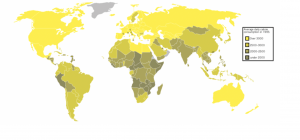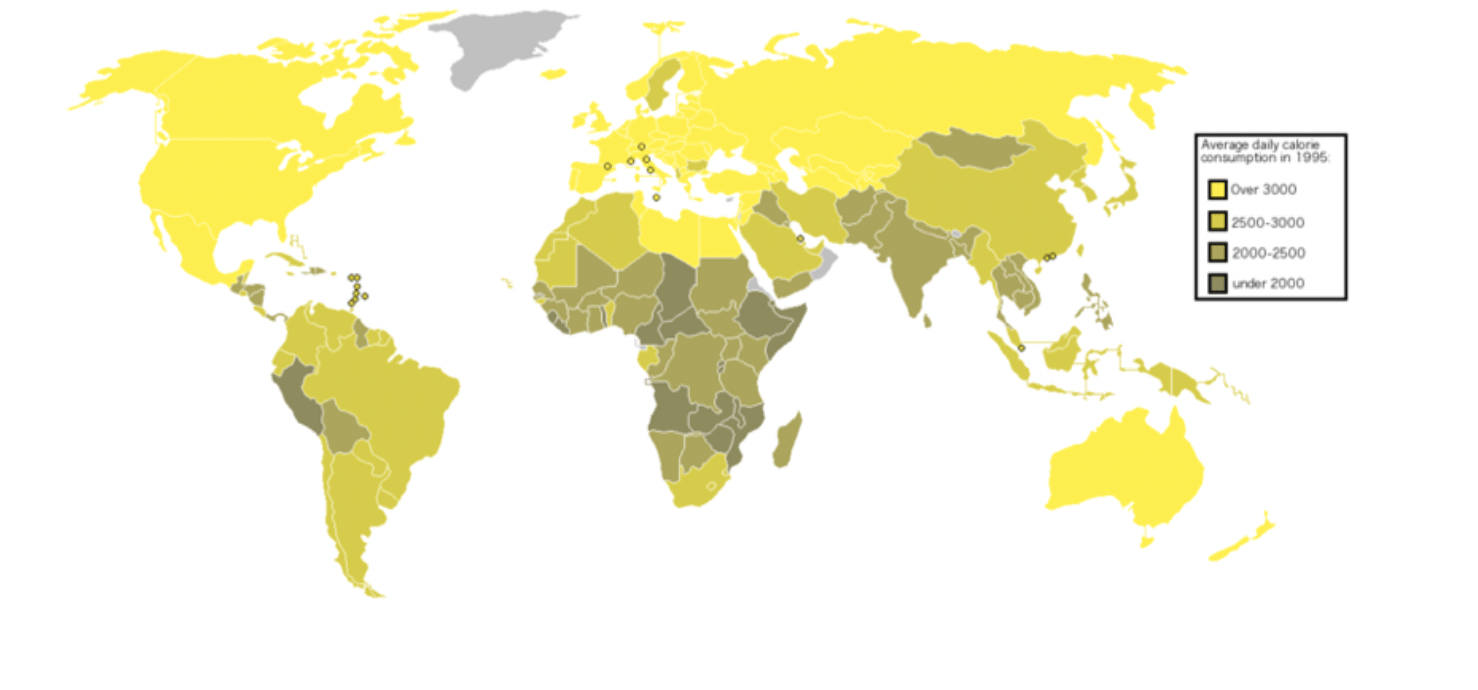
Figure 1: This map represents the average number of calories a citizen of a country ate on average in 1995; the brightest yellow represents a daily caloric intake of over 3000 calories, which is well above recommended daily values. [Source – Wikimedia Commons]
A recent study conducted by researchers at the University of Virginia found that the brain’s biological clock, the system in charge of regulating physiological rhythms (like eating and sleep schedules) is linked to the brain’s pleasure center, which creates dopamine. Eating high-calorie foods causes dopamine to flood into the ventral tegmental area of the brain, which is the portion of the brain that makes sure that basic needs are being met (4). Overtime, this flooding begins to disrupt normal feeding schedules, leading to over-consumption of food (1).
Researchers discovered this connection by studying different groups of mice. Mice given a diet similar to one that they would find in the wild had normal sleep and exercise patterns; they also had average weights. However, mice that were given 24/7 access to high-calorie foods that were high in sugars and fats began to snack constantly and, as a result, became obese. To prove that it was the pleasure-center of the brain causing this change in eating habits, the researchers also studied a third group of mice that had their dopamine-signaling patterns disrupted. These mice, even when presented with high-calorie diets, did not overeat and presented with normal weights (2).
This study has significant implications for the dieting behavior of Americans. Head researcher Ali Güler remarked that “the calories of a full meal may now be packed into a small volume, such as a brownie or a super-size soda. It is very easy for people to over-consume” As humans over-consume food, they fall into habits of snacking that increase their chances of gaining weight and potentially becoming obese (1). The CDC reported in 2008 that obesity-related health-care costs in the US were about 150 billion dollars. Individual health care costs for people with obesity were $1,429 higher than those for people of normal weight. Obesity also increases the risk of developing other serious conditions, including heart disease, strokes, type 2 diabetes, and certain cancers (3).
The instinct to over-consume food has evolutionary roots. Over the course of thousands of years, the human brain has been wired to eat as much food as possible; this instinct dates back to the days of hunter-gathering, where humans often lived in famine. These conditions made it natural for humans to consume as much as they possibly could in the few occasions that they had access to food. Modern humans, however, have nearly unlimited access to food, and consequently, it is very easy for us to overeat (1).
With the knowledge gained from this study, we now have a better understanding of the neurochemistry underlying obesity. Moving forward, researchers and doctors can use this knowledge to study the evolution of the human mind, and perhaps find ways to help patients struggling with obesity also.
References
[1] University of Virginia. (Jan. 3, 2020). Study finds dopamine, biological clock link to snacking, overeating and obesity. ScienceDaily. Retrieved from https://www.sciencedaily.com/releases/2020/01/200103111717.htm
[2] Ryan M. Grippo et al. (Jan. 20, 2020). Dopamine Signaling in the Suprachiasmatic Nucleus Enables Weight Gain Associated with Hedonic Feeding. Current Biology 30, No. 2 ; Retrieved from: DOI: 10.1016/j.cub.2019.11.029
[3] CDC. (August 13, 2018). Adult Obesity Facts. Retrieved from https://www.cdc.gov/obesity/data/adult.html
[4] Nora D. Volkow, Gene-Jack Wang and Ruben D. Baler. (Jan. 2011). Reward, dopamine and the control of food intake: implications for obesity. Trends in Cognitive Science 15, No. 1: 37-46. Retrieved from: https://www.ncbi.nlm.nih.gov/pmc/articles/PMC3124340/?report=classic

Leave a Reply